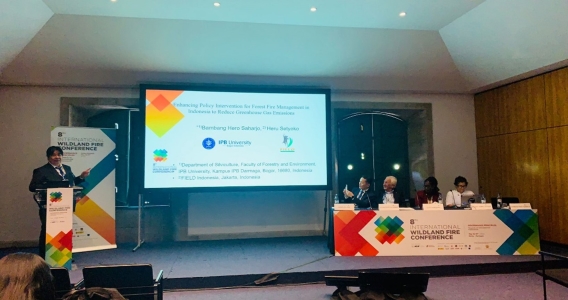Representing Indonesia, IPB University Professor Presents Research Results at International Wildland Fire Conference, Portugal

Professor of IPB University, Prof Bambang Hero Saharjo attended the 8th International Wildland Fire Conference entitled ‘Landscape Fire Governance Framework’ which took place in Porto, Portugal, some time ago. No less than 1,600 participants from 88 countries attended the conference, including Indonesia.
At the event, Indonesia was represented by the Ministry of Environment and Forestry (KLHK), the Korea-Indonesia cooperation project on forest and land fire control and the Department of Silviculture, Faculty of Forestry and Environment (Fahutan) IPB University with full support from International Tropical Timber Indonesia (ITTO).
At the meeting, Prof Bambang explained the results of his research entitled ‘Enhancing Policy Intervention for Forest Fire Management in Indonesia to Reduce Greenhouse Gas Emissions’.
“In essence, this research answers the problem of why fire control efforts do not seem to give significant results in certain areas, even though the control is seriously carried out,” he explained.
Another paper is ‘Forest and land fire prevention through zero-burning practices by rural communities in Indonesia’ which Prof Bambang presented through an e-poster.
As the Director of Southeast Asia Wildland Fire Network for the region, Prof Bambang also reported the current condition of fire incidents and control efforts made which include prevention, suppression and post-fire handling in the ASEAN region, including Indonesia.
“This conference is held every four years. The aim is to follow up on the agreement of each party that was previously initiated in Campo Grande Brazil, 2019 in the context of controlling forest and land fires,” explained Prof Bambang who is also the Executive Director of the Regional Fire Management Resource Center-Southeast Asia (RFMRC-SEA).
He also said, this conference is a place to share knowledge in controlling forest and land fires from various institutions such as the Food and Agriculture Organization (FAO), the United Nations Environment Programme (UNEP), the European Union (EU), the Global Fire Monitoring Center (GFMC) and others as well as various countries with different variations according to the conditions of their respective regions. (*/Rz) (IAAS/RUM)


